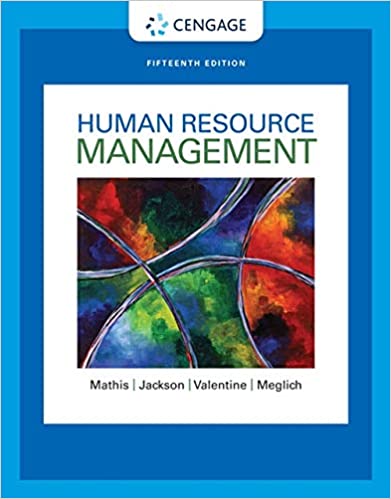
Human Resource Management 15th Edition by Robert Mathis,John Jackson,Sean Valentine ,Patricia Meglich
Edition 15ISBN: 978-1305500709
Human Resource Management 15th Edition by Robert Mathis,John Jackson,Sean Valentine ,Patricia Meglich
Edition 15ISBN: 978-1305500709 Exercise 2
What Is the Real Cost of Your iPhone?
Consumers often look for products with unique features or those that are very inexpensive. In response, companies try to find suppliers that can produce these products at the lowest cost so that they can sell them at a profit. What many consumers may not realize is that often the real cost of the product is not dollars and cents, but human loss and suffering.
Most electronics, including the wildly popular iPhone, are produced primarily in China and other developing nations. Safety and health laws in these countries lag behind those in the United States, and workers there are subjected to strenuous work schedules and poor working conditions. Workers are often housed in overcrowded dormitories. They are frequently required to work excessive overtime schedules-they often work seven days a week-and may be required to handle toxic chemicals while producing the electronic devices. Worker suicides occurred with alarming regularity at Hon Hai's facilities in recent years. Workers have also staged walkouts and pickets to obtain higher wages.
Companies such as Apple, HP, and Samsung deal with these suppliers because doing so is cheaper than manufacturing in the United States. It can take years to develop a productive working relationship with a supplier to ensure product quality and that delivery schedules are met. The companies are naturally reluctant to drop a supplier unless violations are serious and ongoing. Samsung recently determined that the majority of its suppliers fail to comply with safety regulations such as providing adequate safety equipment, conducting evacuation drills, and maintaining reasonable overtime schedules.
Auditing suppliers is now a regular practice for U.S.-based companies, and they are making an effort to reduce safety problems and worker abuse around the world. However, the allure of low-cost products and consumer demand for constant innovation make it difficult to put worker safety first. As long as customers continue to buy iPhones and other electronics and do not object to hazardous work conditions at production facilities, companies are not likely to be motivated to change their practices.
With worker safety issues in mind, consider the following questions:
What can companies do to ensure that their suppliers comply with worker safety and health regulations? How should HR professionals ensure that safety and health are key issues in the workplace?
Consumers often look for products with unique features or those that are very inexpensive. In response, companies try to find suppliers that can produce these products at the lowest cost so that they can sell them at a profit. What many consumers may not realize is that often the real cost of the product is not dollars and cents, but human loss and suffering.
Most electronics, including the wildly popular iPhone, are produced primarily in China and other developing nations. Safety and health laws in these countries lag behind those in the United States, and workers there are subjected to strenuous work schedules and poor working conditions. Workers are often housed in overcrowded dormitories. They are frequently required to work excessive overtime schedules-they often work seven days a week-and may be required to handle toxic chemicals while producing the electronic devices. Worker suicides occurred with alarming regularity at Hon Hai's facilities in recent years. Workers have also staged walkouts and pickets to obtain higher wages.
Companies such as Apple, HP, and Samsung deal with these suppliers because doing so is cheaper than manufacturing in the United States. It can take years to develop a productive working relationship with a supplier to ensure product quality and that delivery schedules are met. The companies are naturally reluctant to drop a supplier unless violations are serious and ongoing. Samsung recently determined that the majority of its suppliers fail to comply with safety regulations such as providing adequate safety equipment, conducting evacuation drills, and maintaining reasonable overtime schedules.
Auditing suppliers is now a regular practice for U.S.-based companies, and they are making an effort to reduce safety problems and worker abuse around the world. However, the allure of low-cost products and consumer demand for constant innovation make it difficult to put worker safety first. As long as customers continue to buy iPhones and other electronics and do not object to hazardous work conditions at production facilities, companies are not likely to be motivated to change their practices.
With worker safety issues in mind, consider the following questions:
What can companies do to ensure that their suppliers comply with worker safety and health regulations? How should HR professionals ensure that safety and health are key issues in the workplace?
Explanation
Worker safety at production units is a v...
Human Resource Management 15th Edition by Robert Mathis,John Jackson,Sean Valentine ,Patricia Meglich
Why don’t you like this exercise?
Other Minimum 8 character and maximum 255 character
Character 255


